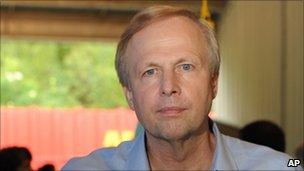BP chief Tony Hayward 'set to stand down'
- Published

BP's board is expected to discuss Mr Hayward's departure
BP's chief executive Tony Hayward is expected to stand down following widespread criticism of his handling of the Gulf of Mexico oil spill.
Mr Hayward's performance in the crisis has been widely criticised.
A statement issued by BP said a board meeting was being held on Monday and "no final decision has been made".
But BBC business editor Robert Peston says the board has in effect made up its mind that Mr Hayward is going, even if the decision is not yet ratified.
The firm, which said over the weekend that Mr Hayward had the board's full support, added that "any decisions will be announced as appropriate".
Mr Hayward is likely to be replaced by his American colleague, Bob Dudley, who has taken charge of the clean-up operation.
BP's board are to sign off accounts, and these will also be discussed on Monday evening.
The accounts will cover spill compensation and costs of up to £19bn, and may result in the worst quarterly loss for a UK firm.
They are also likely to discuss terms of Mr Hayward's severance package.
Over the weekend, a BP spokesman maintained Mr Hayward continued to have the "full support of the board and senior management".
But a US government official, quoted by the Associated Pressnews agency, said senior figures in the company had already briefed them about a change of leadership at the oil multinational.
It is understood the terms of Mr Hayward's employment entitle him to a payout of at least £1m, equivalent to a year's salary.
At the same time, his pension pot is worth £10.8m, resulting in an annual payment of about £584,000.
Mr Hayward began his career with BP 28 years ago as a rig geologist in the North Sea before working his way up to board level. He was a popular choice for the top job when Lord Browne stepped aside in 2007.
But he will be seen to carry the can for the being at the helm for the worst year in the company's history.
Questions raised
Some churchgoers have sympathy for Tony Hayward but still believe he should leave BP
When he became chief executive in 2007, the 53 year-old told journalists his number-one task was to focus "laser-like" on safety and reliability.
The explosion on the drilling rig off Louisiana on 20 April, which killed 11 workers and triggered the worst oil spill in the US, raised questions about his leadership.
Mr Hayward has been heavily criticised by residents of the Gulf coast and US politicians for his handling of the clean-up and for a series of gaffes, including saying that he "just wanted his life back" and that the Gulf of Mexico was a "big ocean" following the leak.
He was also taken to task for attending a sailing event off the Isle of Wight in June.
Mr Hayward was publicly rebuked by members of the House Energy and Commerce Committee last month for "stonewalling" questions at a congressional hearing.
Journalist Tom Bower, who wrote a book called The Squeeze: Oil, Money and Greed in the 21st Century, said Mr Hayward's departure was inevitable because he "hadn't changed the culture" at BP following previous accidents in the US.
"He knew what had to be done, but he didn't do it properly. He was too slow; he wasn't inspired; he wasn't focused enough," said Mr Bower.
The man expected to replace Mr Hayward, BP managing director Mr Dudley, took over the day-to-day operations in the Gulf last month.

Many commentators believe Mr Dudley's American accent will be advantageous from a PR perspective
Many say that, from a public relations point of view, Mr Dudley has the advantage of being American.
He grew up in Mississippi and, according to BP, has a "deep appreciation and affinity for the Gulf Coast".
BP has lost 40% of its market capitalisation since the May spill.
The company's second quarter results due on Tuesday are expected to reveal a provision for the costs of the clean-up, compensation claims and fines to be paid.
Meanwhile, the official overseeing the US government response to the oil spill has meanwhile said the operation to plug the ruptured Macondo well in the Gulf of Mexico permanently has been put back to allow more time for preparatory work.
Retired Coast Guard admiral Thad Allen said the last bit of pipe needed for the process would be put in place in the coming this week, with the actual plugging operation starting in the first week of August. A temporary cap has stopped oil from gushing for more than a week.